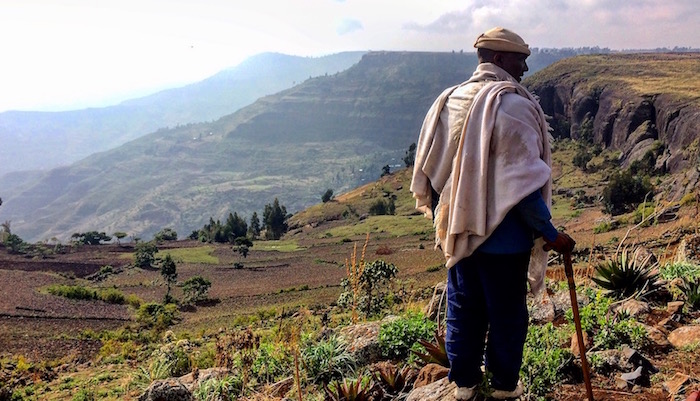
An Ethiopian farmer. (Images by Julia Entwistle).
Note: Julia Entwistle is a graduate student at the University of Michigan’s School for Environment and Sustainability, and this past summer was one of six WDI Global Impact interns placed with businesses and nonprofits around the world. Entwistle worked with the leadership at ADHENO, a non-profit focused on extreme poverty in Ethiopia. Her assignment involved conducting an impact evaluation of ADHENO’s environmental restoration and economic empowerment programs in the Northern Shewa province of Ethiopia. The organization sought the evaluation before rolling out its programs to additional rural sub-districts in Ethiopia. Entwistle worked with WDI’s Performance Measurement Initiative to develop a survey she implemented during her internship.
In the following article, originally published on NextBillion.net – an affiliated media site of WDI – Entwistle chronicles her specific work with ADHENO as well as explaining how profit-based solutions to environmental stewardship can be implemented.
By Julia Entwistle
Managing the economic interests of farmers and the environment is never an easy balance, regardless of where you are in the world. But perhaps nowhere is finding that equilibrium more difficult than Ethiopia. The UN Food and Agriculture Organization notes that about 12 million smallholder farming households account for an estimated 95 percent of agricultural production and 85 percent of all employment in the East African country, which has a total population of more than 100 million.
As a Global Impact intern at the William Davidson Institute (WDI), I spent the summer working with an Ethiopian nonprofit organization. ADHENO (which translates to Integrated Rural Development Association) implements environmental restoration and economic empowerment programs in the North Shewa region. . ADHENO’s work includes training for smallholder farmers on environmentally sustainable management practices such as terracing, use of improved seeds, water run off mitigation and intercropping. Much of ADHENO’s environmental restoration work is aimed at reducing the rate of erosion. Loss of soil matter and nutrients due to heavy rains and steep slopes in the region is a major concern for farmers. Another key program that ADHENO operates is called tree gudifecha. Gudifecha, meaning adoption in Amharic, is an afforestation program where farmers are paid to adopt and care for trees.
These Ethiopian farmers are not exempt from the underlying conflict that challenges most sustainability efforts, balancing the well-being of the environment with economic interests. The farmers are increasingly turning to chemical pesticides and herbicides to maintain crop yields on their increasingly degraded soils. This reliance on synthetic additives only digs these farmers into a bleaker situation as money is spent on the herbicides, which further degrade the soil. Additionally, these chemical additives have another unintended consequence that further jeopardizes the ecosystem as well as crop yields, killing the bees that are needed to pollinate the crops. In Ethiopia, use of herbicides as well as loss of habitat are causing a reduction in the local pollinator population, not unlike the global trend of pollinator decline that is threatening food security around the world. Fewer bees mean decreased crop productivity with yields cut by 12 percent to 36 percent for various crops, according to an FAO report in 2006.
Although ADHENO discourages the use of chemical herbicides, the organization has put forth an effort to restore the pollinator population by appealing to economic incentives. Indigenous species such as acacia and cordia trees are prime pollinator habitat, but provide little utility in terms of a return for a farmer. Alternatively, much of the rural populace can turn a profit from growing eucalyptus trees, which are harvested for use in construction. Although valuable, the eucalyptus tree is native to Australia and therefore does not support native pollinators. As part of ADHENO’s tree adoption program, farmers are paid a small amount of money to plant and care for trees. Of course, eucalyptus is the most desired tree for planting, but for every eucalyptus seedling that ADHENO provides, the farmers must also care for an indigenous tree to serve as bee forage. Through this strategy over 1 million trees have been adopted since the program’s inception in 2008.
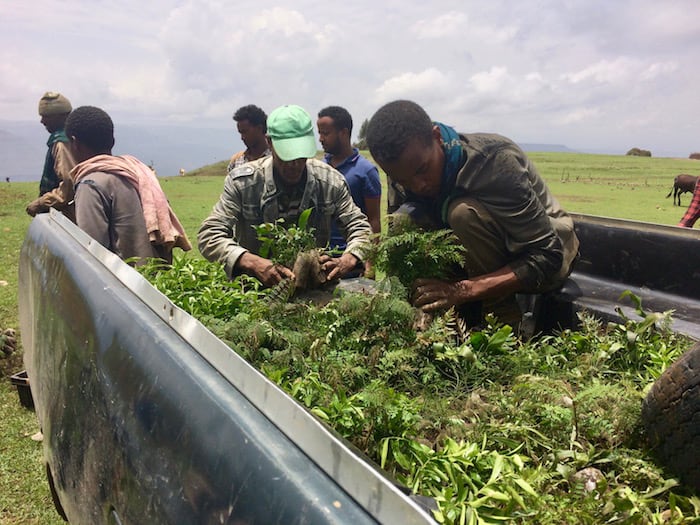
At an ADHENO tree nursery.
In addition to restoring pollinator habitat, ADHENO also encourages the adoption of bee hives as both a way to bolster the pollinator population and create an additional source of income for farmers. Through outside funding sources, ADHENO helped establish a honey cooperative. Initial funds supported the construction of a honey processing plant, covered registration fees and provided for training on how to safely harvest, process and package honey. Since the initial donation of startup funds, the co-op has been self-sustaining and functions like any other cooperative. The farmers sell their honey to the co-op, and the co-op sells the honey at a fixed price. The farmers then receive the profits from their honey sales, which are divided proportionally among the members based on how much honey they contributed. This organization provides a platform for the farmers to profit in a more organized and sustainable way.
The co-op also allows the farmers to package their product and access a wider market than they would otherwise be able to. A downside to this business strategy is that since the co-op sells honey at a fixed price, the profits received by the farmers are not responsive to fluctuations in the market price of honey. For this reason, the co-op forbids private sales for its members, in other words, to be a member of the co-op, farmers have to agree to sell all of their honey to the co-op, even if the market price is higher than the co-op’s fixed price. On the other hand this model guarantees some income for the farmers even if the market price for honey is below the fixed price.
It is also a goal of the co-op to encourage farmers to take up beekeeping. Senior co-op members conduct trainings with new and prospective members on keeping bees and harvesting honey. The co-op currently has more than 400 members.
My work with ADHENO is conducting an impact evaluation to determine what effect ADHENO’s programs, including beekeeping, farmer training and tree plantings, are having on the livelihoods of rural farmers. Along with other students from the University of Michigan’s School for Environment and Sustainability, we are evaluating both the ecological and economic impact of these programs. While our analysis of the data collected this summer is ongoing and we hope to have a final report of the results by the end of the year, we do know that ADHENO has certainly demonstrated innovative ways to advance the needs of farmers and the environment.
Meanwhile, ADHENO is planning to expand its programs to several additional rural communities in the North Shewa region and hope to use our evaluation to guide its growth for maximum impact.
Through the Economic Development Initiative under The U.S.-Middle East Partnership Initiative (MEPI), WDI partnered with Al Akhawayn University of Ifrane, Morocco, to provide business training to 60 Moroccan entrepreneurs from 2004 to 2006. The goal of the project was to strengthen skills among entrepreneurs and business people working for small- and medium-sized enterprises in Morocco through targeted training of business managers and direct consulting at the firm level in the areas of handicraft, tourism, electronics, agribusiness, offshoring, and textiles.
The overall objective was to help entrepreneurs in Morocco benefit from its recently concluded Free Trade Agreement (FTA) with the United States and provide Moroccan firms with the tools needed to grow into more competitive companies. By equipping the owners of 60 small businesses with management skills in key areas and encouraging participants to share their learning with their employees, the training was projected to impact up to 1,800 people in small businesses throughout Morocco.
The project included a Small Business Training Component (featuring workshops at Al Akhawayn University), a 7-week student consulting project, and three 14-week summer consulting projects featuring students from the University of Michigan Ross School of Business. The consultant teams presented their findings to the clients and to the US Ambassador in Rabat and received appreciation for their concrete business solutions.
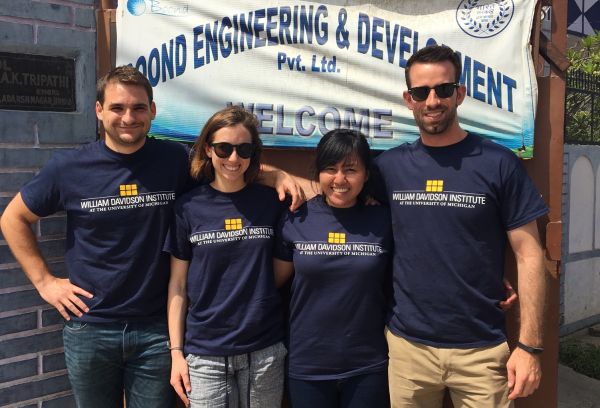
As their 2017 MAP project, U-M students Florian Eizaguirre, Amelia Harris, Matilda Narulita and Chris Atkins are advising Boond, a renewable energy firm in India.
Tom Reidy’s previous work experience and core MBA classes this year at U-M’s Ross School of Business have focused on operating a business in the developed world. That’s one reason Reidy is excited to head to South Africa to work for the startup organization, Mbuyu, as part of the school’s annual Multidisciplinary Action Projects (MAP).
“I’m interested in learning how business strategy differs in low-income, or base of the pyramid, markets because the frameworks we learned in our core classes over the last year have focused on developed markets,” said Reidy, a first-year MBA student. “Also, this will be my first time working with a start-up and dealing with impact investing, so I’m hoping to achieve a good understanding of how those things function.”
Mbuyu is working with South African National Parks to protect some of the world’s most critical honey bee ecosystems while developing a business to produce and sell organic honey. The MAP in South Africa is one of 11 student projects organized and sponsored by WDI. The Institute also is providing funding for two additional MAP projects.
MAP is an action-based learning course offered at Ross in which MBA students receive guidance from faculty advisors. Each project requires analytical rigor, critical thinking, and teamwork. Participating organizations receive top-notch deliverables and data-driven recommendations from the teams of students. (Find out more about WDI’s MAP projects over the years here.)
After learning about their projects and conducting secondary research for several weeks, the students then spend two to four weeks working with their organizations in the field.
Carissa De Young, a second-year MBA who is a dual degree student at Ross and the School of Natural Resources, will travel to India with her MAP team to work for GE Power.
“I’m most looking forward to learning more about the challenges in rural areas and how large companies can use their expertise to provide solutions,” she said.
Below is a summary of each WDI-sponsored MAP project.
African Institute of Management (IAM) – Senegal
Advised By: Paul Clyde, WDI and Ross School of Business
Team Members: Paul Miyamoto, Kaitlyn Fischer, Bradley Rollins
Founded in 1996, the Institut Africain de Management Group (IAM) is one of the leading private business schools in Central and West Africa. IAM is developing a master’s degree program in supply chain. This program will address the needs in Senegal and West Africa generally, by increasing the supply chain management talent available in the region.
The goal of this project is to develop a market entry strategy for a supply chain program at IAM. The team will learn about the program and then conduct competitive analysis and interview businesses that either are or employ potential customers in Senegal.
Aparajitha Foundation – India
Advised By: Paul Clyde, WDI and Ross School of Business; Bob Dittmar, Ross School of Business
Team Members: Diocelyn Batista Rijo, Rachel De Leon, Adam Fitzmaurice, Nancy McDermott
The Aparajitha Foundation is an arm of the Aparajitha Group. It is committed to the cause of creating transformational change in adolescents by using audiovisual technology to deliver life skills training to economically disadvantaged children in India’s Tamil Nadu state.
The MAP team will conduct a market analysis that will enable the creation of a financial model for an overarching ecosystem to support the micro small medium entrepreneurs (MSME) sector in Madurai, India.
Aravind Eye Care System – India
Advised By: Paul Clyde, WDI and Ross School of Business; Thomas Buchmueller, Ross School of Business
Team Members: Kaitie Conrad, Nikita Jambulingam, Siddhi Kaul, Ravi Patel
Aravind Eye Care System is a network of hospitals, clinics, community outreach efforts, factories, and research and training institutes in south India that has treated more than 32 million patients and has performed 4 million surgeries since its 1976 founding.
The student team will work with Aravind’s senior leadership to develop a roadmap for the eyecare system’s future growth.
Banyan Global – Ghana
Advised By: Ted London, WDI and Ross School of Business; Jim Walsh, Ross School of Business
Team Members: Vagisha Goel, Eric Perrin, Adi Singhal, Courtney Tatum
Banyan Global is a development consulting firm that works in five continents. It is implementing a USAID-funded project to increase access, improve efficiencies and expand quality maternal-child healthcare in rural areas. Banyan is working with private maternity home owners who may be nearing retirement on “transformation” options – selling the facility, leasing out the facility, bringing on a partner, bringing on a manager, or bringing on a specialist who will enable the facility to diversify its service offerings.
The MAP team will focus on an in-depth investigation into the the financial constraints and opportunities for private maternity homes in Ghana, with a specific focus on the projected return on specific potential investments, and the feasibility of various credit options to finance those investments.
Boond Engineering & Development – India
Advised By: Ted London, WDI and Ross School of Business; Jane Dutton, Ross School of Business
Team Members: Chris Atkins, Florian Eizaguirre, Amelia Harris, Matilda Narulita
The students will build a strategy around data collection and analysis and finding ways to monetize it. Boond collects a lot of consumer demographic data along with energy usage data from its portfolio of micro-grids in rural communities. It wants to analyze the data and explore ways of sharing its findings to those interested for a price.
CARE International – Egypt
Advised By: Ted London, WDI and Ross School of Business; Jane Dutton, Ross School of Business
Team Members: Andrew Hauser, Colleen Hill, Zack Molnar, Elizabeth Padilla
Working with the Danone Ecosystem Fund, CARE International is working to improve the socio-economic conditions of dairy farmers in Egypt using a collaborative model that engages cooperatives and community development associations in the country.
The MAP students will partner with Danone and CARE International to facilitate access to quality information for dairy farmers to improve their skills and productivity, and develop the institutional capacity, including good governance practices of farmers’ organizations.
GE Power – India
Advised By: Ted London, WDI and Ross School of Business; Sugato Bhattacharyya, Ross School of Business
Team Members: John Barbour, Carissa De Young, Claire Fletcher, Wiles Kase, Christina Lee, Jon McCartney
GE Power provides power generation, energy delivery, and water process technologies to solve issues in local markets.
The student team will develop a go-to-market recommendation for a new set of energy products and services that are focused on providing electricity in emerging markets.
Imperial Health Sciences – South Africa
Advised By: Paul Clyde, WDI and Ross School of Business; Ravi Anupindi, Ross School of Business
Team Members: Jaymon Ballew, Jeremy Egan, Francesco Esposito, Emily Lombardi, Mary Rockas
IHS provides supply chain solutions to the public and private pharmaceutical markets in Africa. It has partnered with several development and global health leaders from the public and private sectors to launch Lulama, an innovative financing partnership that will strengthen independent, community pharmacies in underserved areas, and enable access to quality, life-saving medicines to those who need them most.
The MAP team will assess the Lulama community pharmacy pilot program from the perspective of all the stakeholders for its potential to be a sustainable, scalable and replicable solution, and make recommendations.
ITC Limited – India
Advised By: Ted London, WDI and Ross School of Business; Sugato Bhattacharyya, Ross School of Business
Team Members: Gustavo Calzavara, Rakshit Gupta, Paula Luu, Linh Nguyen
ITC is a major diversified Indian conglomerate that creates multiple drivers of growth by developing a portfolio of businesses in the consumer goods, hospitality, paper, packaging, agribusiness, and information technology sectors.
The MAP team will develop a robust and scaleable business model in the fruits and vegetables space that could lead to a sustainable business that significantly enhances value for farmers in India.
Mbuyu Group – South Africa
Advised By: Ted London, WDI and Ross School of Business; Jim Walsh, Ross School of Business
Team Members: Megan Knoch-Dohlin, Ari Lowell, Tom Reidy, Christine Rickard, Sara Schmidt, Neil Tidwell
Mbuyu Group is working with South African National Parks to protect some of the world’s most critical honey bee ecosystems and strengthen the bee population. The group also hopes to become one of the largest global producers of organic honey.
The student project will develop a comprehensive fundraising communications strategy and materials recommendations to raise $5 million from international funding institutions and individuals. The money raised will support the purchase of 50,000 beehives on behalf of poor communities surrounding the nation parks.
Vayu – Malawi
Advised By: Paul Clyde, WDI and Ross School of Business; Thomas Buchmueller, Ross School of Business
Team Members: Jason Doran, Cazzie Palacios Brown, Maggie Vasquez, Charles Walton
Vayu is a Michigan start-up developing drones to aid medical care such as flying shipments of drugs, blood and other samples to remote villages.
The students will develop a market entry strategy plan for Vayu for Malawi.
Global Fairness Initiative – Nepal
Advised By: Mike Gordon, Ross School of Business; Paul Clyde, WDI and Ross School of Business
Team Members: Molly Hope, Kevin Jones, Julie Smith, Allen Xu
The Global Fairness Initiative promotes a more equitable, sustainable approach to economic development for the world’s working poor by advancing fair wages, equal access to markets, and balanced public policy to generate opportunity and end the cycle of poverty.
The student team will determine a sustainable financial model for Better Brick Nepal, a market-based program that is transforming Nepal’s brick industry by eliminating forced, bonded, and child labor.
Vietnam Partners, LLC – Vietnam
Advised By: Stewart Thornhill, Ross School of Business; Paul Clyde, WDI and Ross School of Business
Team Members: Niall Bachynski, Maddy Bourgeois, Nick Daen, Sara Faurer, Juan Recalde, Aaron Wolff
Vietnam Partners works with companies and investors to build successful businesses that exploit opportunities arising from Vietnam’s accelerating integration into the global economy.
Vietnam Partners in collaboration with the Hanoi School of Business has been requested to set up and lead the development of a Center for Entrepreneurship and Innovation (CEI) and establish a start up venture capital fund.
The co-founder of a start-up venture in South Africa that aims to save the honey bee will share how he designed the initiative to have economic, social and environmental impact as part of the WDI Global Impact Speaker Series. The talk begins at 5 p.m., Nov. 16 in room R2230 at the Ross School of Business, and is free and open to the public.
(Click here to watch Madison Ayer’s Nov. 16 classroom presentation.)
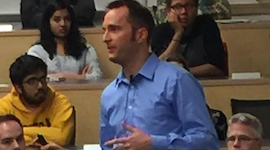
Madison Ayer, who has led several social ventures in Africa, including Honey Care Africa and Farm Shop, will discuss what he learned from those enterprises to launch Mbuyu Group, a large-scale honey bee conservation initiative. Mbuyu Group is working with South African National Parks to protect some of the world’s most critical honey bee ecosystems and strengthen the bee population. The group also hopes to become one of the largest global producers of organic honey.
Ayer has been featured in the WDI speaker series in the past. Last year, he talked about Honey Care Africa and Farm Shop, two ventures in Kenya that serve those living at the base of the pyramid.
Honey Care Africa provides smallholder farmers with beehives and harvest management services. In addition, it guarantees a market for the beekeeper’s honey at fair trade prices, helping to provide a steady, consistent source of income.
Farm Shop recruits and trains franchisees who then independently operate community-level, agro-dealer shops that supply smallholder farmers with seeds, fertilizers, tools, veterinary medicines and other items to improve crop yields.
In his 2015 talk, Ayer discussed the challenges that come with integrating low-income producers and consumers into the supply chain, including poor infrastructure, security concerns, informal regulations, and high costs. But if successful in overcoming these hurdles, Ayer said it can lead to long-term competitive advantage and positive economic impact on communities across the supply chain.
Watch Ayer’s 2015 presentation here and his interview with WDI Senior Research Fellow Ted London below:
In addition to his previous talks, Ayer also has engaged with WDI’s Scaling Impact Initiative and the Performance Measurement Initiative (PMI).
As part of a project funded by the German development agency GIZ, WDI studied the landscape of BoP facilitators in the sub-Saharan Africa region. The Scaling Impact initiative conducted field visits to Ethiopia and Kenya – including to Honey Care Africa and Farm Shop.
WDI’s Performance Measurement Initiative team also conducted a qualitative impact assessment in 2012 to identify Honey Care’s impact in alleviating poverty on children age eight years and younger, and developed a case study as part of the series entitled Focusing on the Next Generation: An Exploration of Enterprise Poverty Impacts on Children. The goal of the series, funded by the Bernard Van Leer Foundation, was to gain a greater understanding of the ways in which businesses in emerging markets impact young children’s lives and the potential to optimize impact on children.
Additionally, WDI Publishing also produced a popular teaching case study on Honey Care Africa that examined the business’s transition from obligating farmers to maintain their own hives to providing hive management services. The case also explored ways to enhance this new model, including strategies to reduce side selling. It was written by London and Heather Esper, senior program manager of PMI.
Kristin Babbie, a senior project administrator at WDI’s Grants Management team, recently attended the Global Youth Economic Opportunities Summit and authored the following post for NextBillion.net. NextBillion, a WDI affiliated site, originally published the article on Oct. 12, 2016.
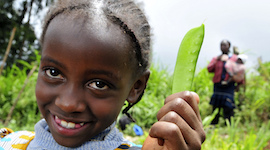
In 2013, I interviewed a group of young people at a youth empowerment center in Kenya about their perceptions of agriculture as a livelihood. The interviews were part of a study driven by concerns about Kenya’s youth bulge, coupled with anecdotal evidence that the country’s youth had negative attitudes about working in the agricultural sector. The attitudes of the youth I interviewed were shaped primarily by the significant barriers they faced in accessing the capital needed to develop agriculture-based enterprises. Indeed, my findings pointed to the conclusion that the youth and agriculture problem runs deeper than the “youth are not interested” narrative.
Fast forward to 2016 and the Global Youth Economic Opportunities Summit hosted by Making Cents International, where the youth and agriculture problem was highlighted and the simplified assumptions underpinning it – such as “youth just are not interested” – were challenged.
So why is the youth and agriculture problem a concern to international development practitioners?
For one, agriculture is the “backbone” of many sub-Saharan countries. For instance, agriculture accounts for about 70 percent of the total labor force and 30 percent of Gross Domestic Product in Kenya. Second, rural households in Kenya rely heavily on subsistence agriculture for food consumption. And third, the country’s labor market lacks the ability to meet the demand of young job seekers. The highest unemployment rates in Kenya are for 20-year-olds, at 35 percent, followed by 25-year-olds, at 25 percent.
At the Global Youth Economic Opportunities Summit’s plenary titled “Seeding the Future: Land Tenure, Technology, and Opportunities in the Rural Economy,” panelist Thomas Jayne, a professor in the Department of Agricultural, Food and Resource Economics at Michigan State University, emphasized that agriculture is not a “declining sector” in sub-Saharan Africa. Over the next 20 years in sub-Saharan Africa, he said 350 million youth will pursue employment, but even under the most favorable conditions only 25 percent will find wage-paying jobs in the formal economy. Agriculture offers a potential solution.
USAID’s Feed the Future Initiative cites the World Bank’s “Agriculture for Development” report, which makes the investment case for agriculture in developing countries. Perhaps the most compelling finding is that for people with the lowest incomes, “GDP growth originating in agriculture is about four times more effective in reducing poverty than GDP growth originating outside the sector.” Jayne presented the argument that multiplier effects offer the most significant benefit for investments in agriculture. Given the sheer size of the agricultural sector in sub-Saharan Africa in terms of number of producers, a slight increase in per capita income would have an overall positive economic impact.
“Since 2013, farmers’ sales of Feed the Future-supported crops increased 30 percent, on average. For poor farming families, this means more income to: buy more food, access healthcare, pay for school, save for & invest in the future. Economic empowerment is good for rural families, their communities and countries, and the world. It all adds up.”
Ending Hunger and Poverty: A Snapshot of Progress
Following Jayne’s talk, Odenda Lumumba, CEO of the Kenya Land Alliance, described a rural-to-urban migration trend he has observed in Kenya. Young people move to urban areas to attend school, he said, and once they are there, it is not uncommon for them to move to slums due to lack of opportunities. He implied that in many cases greater opportunity awaits youth in rural areas than in urban areas. The World Bank’s Agriculture for Development report points out that while agriculture is a driver of sub-Saharan African economies, only 4 percent of public spending is allocated to the sector. Lumumba called on governments, donors and the private sector to invest in agriculture where it can have a significant multiplier effect: “Today agriculture has the biggest opportunity to end hunger and eventually end poverty. But how do you do that? That is the challenge.”
Prior to the plenary, Beth Dunford, assistant to the administrator in USAID’s Bureau for Food Security, said that it is not that youth in sub-Saharan Africa are simply not interested in agriculture; it is that they are not interested in pursuing the agriculture of their parents. Dunford said, “Young people bring the kind of innovation, energy and enthusiasm that we need to tap into (for) transformative solutions to many of our biggest problems. Youth are interested in that, and that is what we need for agriculture.” Her message resonated with the research I did in 2013, in which youth frequently reflected on their experiences witnessing their parents’ hard manual labor. Dunford described Feed the Future’s approach to development, focused on creating enabling environments with youth – not for youth – to grow and expand their agricultural enterprises. A key takeaway message was that “there is money in the soil,” an expression Dunford heard while in Zambia.
The panel included two youth who both provided on-the-ground perspectives of how they had pursued agriculture in their home countries of Tanzania and the Philippines. First, 22-year-old Sirjeff Dennis of Jefran Agrifriend Solutions (JAS), based in Tanzania, shared his experience of growing up in a slum where finding a meal was difficult. When he saw a woman in his neighborhood lose her baby to malnutrition, it gave him the passion to end hunger through agriculture. Despite earning his degree in petroleum engineering, Dennis decided to become an agricultural entrepreneur, or “agripreneur.” Five years ago he started his company with $50 USD. He purchased 50 chickens and eventually expanded his enterprise to include maize, rice, tomatoes, Chinese cabbage, okra, eggplant and onion. On one hand, he explained, there is a common stereotype among Tanzanian youth that agriculture is something that should be done by poor people with a low level of education; on the other hand, people throughout his country really love it.
Dennis’ comments suggest that there is a cultural value to agriculture; however, there is a perception that those who pursue careers in the sector are minimally educated and are destined to be poor due to the difficulty in generating sustained incomes. To assist in debunking this attitude, Dennis created a youth and agriculture initiative within JAS, recruiting and training young people to start their own agricultural enterprises. He had hoped for 30 applicants but received 300, demonstrating the interest of youth in agriculture.
Today, Dennis’ business employs 37 people, with 80 percent of them 23 or younger – and 20 percent are women. Despite the success, he points to key challenges that threaten the sustainability of his enterprise. For one, access to finance is a significant problem for Dennis. For example, despite the exposure he gained through winning a MasterCard Foundation award, the local bank was still not willing to provide him with a loan. The reason? Because he is 22 and doing agriculture. Another challenge, he said, is access to equipment. He had to import equipment through Alibaba, an online marketplace, to scale his business, which was very expensive. Dennis recommended that the government in his country lower taxes for young farmers, provide assistance to youth to form farming cooperatives, and provide financial assistance. He stated that development practitioners must create awareness among banks and governments about the unique challenges agri-preneurs face, so that investments in agriculture make sense.
Another young agri-preneur, Cherrie Atilano, shared her perspective as it relates to a social enterprise she founded called AGREA, based on the island of Marinduque in the Philippines. AGREA leads a youth movement in support of agriculture, offers a variety of trainings and events, promotes sustainable agricultural technologies, and bridges the gap between farmers and consumers. AGREA is known for its tagline, “Making farming cool, smart, sexy, and humane.” Atilano starting farming when she was 12 years old and 18 years later, she is still involved. She said a lot of young people in the Philippines, especially professionals, are going back into the sector. There are thriving high-value markets for organic and artisan foods in Southeast Asia, she said, and the Filipino government has begun to recognize the value of agriculture. For example, a new law mandates all public and private schools visit a farm once per year as a field trip. Finance, Cherrie noted, remains the most significant barrier to young farmers working to start their own agricultural enterprises in her country.
Speakers at the summit made a strong argument for the potential of agriculture and why the development community should continue to challenge the assumptions behind the notion that youth are not interested in it. However, the transformation of structures (including government and the private sector) and processes (such as laws, policies, culture and institutions), which in turn influence ability to respond to shocks, trends and seasonality, must be addressed within the local context. These macro factors have an ultimate influence on the ability of youth to access key capital to develop, sustain and scale their agri-enterprises.
Photo by Neil Palmer (CIAT) via Flickr
After graduating from the University of Texas, Patrick Huang began his career as a management consultant while giving free advice to social entrepreneurs in emerging markets. But he soon wanted to do much more than dole out advice on the side, so Huang decided to get his MBA and join a social impact enterprise in an emerging market.
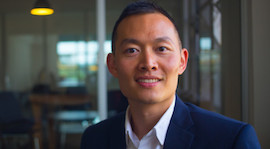
The Ross School of Business at the University of Michigan was at the top of Huang’s list of graduate schools, and “WDI was one of the key reasons,” he said.
“Ross and WDI stood out when I was applying because of its dedicated focus on the (base of the pyramid) in emerging markets through thought leadership and opportunities for students to engage directly in emerging markets through (student projects) and internships,” said Huang, now working with a startup enterprise in Kenya.
He enrolled at Michigan Ross in fall 2011 and that winter took part in a WDI-sponsored Multidisciplinary Action Project (MAP), an action-based learning course in which students work for a company or organization on a special task.
He was part of a four-person team working for the nonprofit charity CARE in Bangladesh, which was tasked with developing a micro-franchise pilot for small-scale businesses that sell agricultural inputs such as seed and medicine for livestock. The business plan included consolidation and coordination to improve efficiencies at the companies.
The team worked in a small farming town a few hours outside the capital of Dhaka. They often sat in huts and interviewed farmers and business owners.
“Although our team and our interviewees came from different sides of the world, we found common ground as we came to understand their challenges, their struggles, and most importantly, their ambitions for a better life,” Huang said.
That summer, he traveled to Mumbai, India as a WDI intern working for Village Capital, a peer-led business accelerator and investment program for early-stage social enterprises. Village Capital was planning to start two business accelerator programs, one focused on enterprises based in Mumbai and another sector-specific program for enterprises across India. Huang’s job was to recruit interested and qualified social enterprises across India to the program.
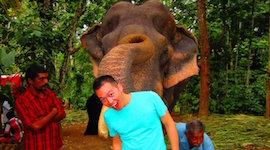
Huang poses with an elephant during his internship in India.
Huang soon discovered he not only had a knack for identifying potential businesses, he enjoyed it. He met with budding business owners, angel investors, and entrepreneur associations. He would meet them for coffee at a local cafe or for drinks during happy hour. He learned about each enterprise’s team, its business model and plans for growth.
“At the same time, I also learned about the city, the people, the culture,” he said. “I traveled across India from historical sights like the Taj Mahal to tea plantations in Kerala, absorbing and trying as much as I could. I sought to not only identify prospective businesses but also refine my own interests.”
By summer’s end, Huang had conducted preliminary due diligence and created a pipeline of 45 prospective early-stage, social enterprises.
“More importantly, I knew that I wanted to work in this environment where the growth of the entire country was almost tangible,” he said.
After graduating in 2013, Huang moved to Nairobi to work as a consultant for small- and medium-sized enterprises (SMEs). He now is chief of staff and principal business development officer at Umati Capital, a financial technology startup that provides financing alternatives for SMEs in agri-business, retail suppliers and consumer goods manufacturers in East Africa.
He said his WDI internship and MAP experiences “refined and strengthened my current passion for entrepreneurship as the driver for economic growth in emerging markets.” He also identified his role in this field – finding areas of collaboration and opportunity.
But to accomplish this with prospective clients in Kenya, he thought back to what he learned during those meetings over coffee in Mumbai and the interviews with farmers in their huts in Bangladesh. What made those projects succeed was Huang’s humility and empathy when interacting with people from a different culture or background. He also practiced “active listening” to show he was attentive and striving to understand. These are traits he applies in his work today.
“Only by understanding these lessons could I identify the common ground that served as our foundation to work together and achieve a common goal,” he said. “With my Ross MBA and my experiences at WDI, I am grateful for that opportunity, and look forward to working with businesses that can generate value for both the shareholders and the society as a whole.”
Note: This is one in an ongoing series of articles profiling past WDI interns and Multidisciplinary Action Project (MAP) team members and their career paths. Additional profiles in the series may be found here.
Each summer, as part of its mission to provide high-quality learning opportunities to University of Michigan students, WDI sponsors interns who work overseas with international organizations.
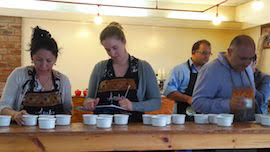
This year, five U-M graduate students representing five different schools across campus are working in the education, healthcare and poverty alleviation fields. The projects are based in Ghana, Rwanda, Ethiopia, India, Peru and the Philippines.
In addition to providing the students with meaningful business and cultural experience that comes with working internationally, the summer internships also provide WDI’s five initiatives with important insights from the field. This summer’s internships are managed in collaboration with WDI’s Performance Measurement Initiative (PMI), Education Initiative, and Healthcare Initiative.
“The PMI team is excited to provide measurement advice and support to WDI’s interns, learn from their related experiences, and apply those learnings to current and future projects,” said PMI Program Manager Heather Esper. “In particular, we are interested in learning more from the Pearson Affordable Learning Fund/ Affordable Private Education Centres internship in the Philippines. (Learn more about these projects below). Implementing and institutionalizing a new measurement system centered on learning, and conducting demand analyses and customer segmentation are both areas of great interest to our partners.”
Here are the interns and their projects.
Naomi Wilson, School of Education
Organization: Pearson Affordable Learning Fund (PALF) in partnership with Omega Schools
Country: Ghana
PALF makes minority equity investments in for-profit companies to meet the growing demand for affordable education across emerging market countries. Their vision is to help millions of children in the world access a quality education in a cost effective, profitable and scalable manner. Additionally, organization wants to demonstrate to governments and donors that private education can help to educate their youngest citizens in an efficient way.
Omega Schools is a chain of affordable schools in Ghana delivering quality education affordably to 15,000 low-income students.
As Omega continues its growth, it needs a structured, evidence-based, and easy-to-use software tool for selecting new school sites and determining what price point would be appropriate for specific locations. Wilson will research similar tools already in place, analyze enrollment and profitability of current schools, visit current and potential school site and identify key factors to be considered in site selection.
Michael Manansala, Ford School of Public Policy
Organization: PALF in partnership with Affordable Private Education Centres (APEC)
Country: The Philippines
APEC is a chain of affordable, high-quality secondary schools based in metro Manila focused on employability and life skills.
Manansala will aim to improve annual student assessment and quarterly academic reporting by analyzing existing student performance data and benchmarking it against publicly available data to determine learning outcomes. He also will review existing research and conduct a series of qualitative customer interviews and quantitative customer surveys to better understand why some parents send their children to APEC while others don’t.
Carissa De Young, Ross School of Business/School of Natural Resources and Environment
Organization: Shared-X
Country: Peru
Shared-X is a for-profit, startup social impact business in its first year of operation. It works to lift thousands of farmers out of extreme poverty by deploying advanced farming techniques on highly productive land to close the agricultural yield gap between developed and developing nations. Through the direct sale of specialty crops to international markets, Shared-X provides social, environmental, and economic benefits to local farming communities and generates strong returns for shareholders. Shared-X operates test farms that demonstrate best farming practices and secure contracts for its crops. It then expands access to its technology and markets to smallholder farmers in surrounding communities.
De Young will design a strategy to measure, communicate, and expand the social impact of Shared-X’s model of engagement with smallholder farmers. She will identify and measure impact by conducting interviews with stakeholders and experts ranging from current and potential future cooperative members, Shared-X personnel, and leaders in similar companies. She will then compare her findings with industry best practices to create a proposal for key performance indicators.
De Young also will identify a pathway to continue replicating the Shared-X model with additional smallholder farmers in other regions where Shared-X farms exist.
Elisabeth Michel, School of Public Health
Organization: The Ihangane Project (TIP)
Country: Rwanda
TIP empowers local communities to develop sustainable, effective, and patient-centered health care delivery systems that holistically respond to the needs of vulnerable populations. It envisions a world in which quality health care leads to healthy, inclusive, and empowered communities. TIP has been working with Ruli District Hospital in Rwanda and its seven associated health centers to determine key strategies for improving health outcomes within the community.
Michel will facilitate a successful hospital retreat that creates a shared vision of high-quality and patient-centered health care at Ruli, and includes an implementable framework for decision-making and problem solving. She also will help the hospital staff implement recommendations that come from the retreat.
Dilparinder Singh, Ross School of Business
Organization: PATH
Countries: India and Ethiopia
PATH is a Seattle-based international, nonprofit health organization that creates sustainable, culturally relevant solutions, enabling communities worldwide to break long-standing cycles of poor health. PATH is one of many global health organizations working with countries to reduce malaria deaths.
Singh will work with PATH to conduct a market landscape of current malaria testing and treatment algorithms in Ethiopia. He also will work with PATH’s India Innovation Hub, which encourages innovative approaches to healthcare.
Sir Fazle Hasan Abed was recently on the University of Michigan campus to receive a global health award. While there, he sat down with Kyle Poplin, editor for NextBillion Healthcare, an initiative of WDI, to talk about his work in Bangladesh. This article was originally published April 13, 2016 on NextBillion.
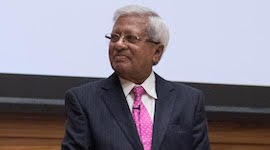
It was 1972 and Bangladesh was “an international basket case.” The Liberation War had just ended and the country was still reeling from the deadliest tropical cyclone ever recorded, Bhola, two years before.
The desperate conditions in his native country convinced Fazle Hasan Abed to quit his executive job at Shell Oil and try to help. But he couldn’t have foreseen the impact he would have on Bangladesh – and the world – when he founded what was originally a short-term relief effort called the Bangladesh Rural Advancement Committee.
That original group of a couple dozen people grew into what is now called BRAC, the largest non-governmental development organization in the world, with a $1 billion budget and 111,000 employees offering services to 138 million people. And Bangladesh, not coincidentally, has transitioned from the world’s second poorest country to lower middle income.
BRAC’s overarching philosophy is that poverty has many causes, so many solutions are needed. The organization provides programs in microfinance, education, health care, job training, empowerment of women, sanitation, agriculture, etc., and owns 16 social enterprises that provide $700 million in revenue. The remaining $300 million in revenue is generated through donations.
Abed – now officially Sir Fazle after being knighted by Queen Elizabeth II – has been called one of the world’s 50 greatest leaders, and was hailed as “a public health hero” when the University of Michigan awarded him one of its most prestigious honors, the Thomas Francis Jr. Medal in Global Public Health, on April 6.
The next day, in a sit-down interview with NextBillion, the 80-year-old talked about his four-decades-and-counting quest to empower the poor.
“The greatest influence on me about people’s lives and poverty was my mother. She was very concerned about poverty and poor people and she tried to help them as much as she could,” he said. “(After starting BRAC) I got to know poverty firsthand in the villages of Bangladesh. I became more aware of the multidimensional aspect of poverty. It’s not just lack of income, it’s lack of opportunities, lack of health care, lack of education. It’s all kinds of deprivation that constitutes poverty. Ultimately, it’s also powerlessness to do something about poverty, how to come out of it.
“In the old days, one used to think that one takes resources to the poor people and distributes them, and they come out of poverty. But we thought you have to involve the poor people themselves in the fight against poverty.”
He said he developed that concept – considered revolutionary in the ’70s – from reading “Pedagogy of the Oppressed” by Brazilian educator Paulo Freire. “Oppressed people have got their own way of thinking about life,” Abed said, “and if you can somehow mobilize them, make them critically aware of their own condition, and get them to act on their own behalf, make them an actor in their own history, then things become much easier.”
Perhaps the best example of Abed and BRAC putting that idea into practice was an oral rehydration therapy (ORT) program aimed at ultra-poor women in Bangladesh starting in the early 1980s. Diarrheal disease, the second leading cause of death in children under age 5, leads to dehydration, but it can treated with a simple mixture of water, sugar and salt known as ORT. Conventional wisdom held that illiterate, uneducated women were incapable of properly mixing and administering ORT, but BRAC taught millions of women from Bangladesh’s slums and villages how to do it. And today Bangladesh’s ORT rates are among the best in the world.
BRAC also pioneered a “graduation model” that empowers the ultra-poor to move from safety net programs to income-earning activities and self-sufficiency.
In the free-ranging video interview below, Abed talks more about BRAC’s future than its illustrious past.
He’s optimistic, for example, about the next generation of businesses that might help support BRAC, highlighted by a transition from a free to paid education model. He believes everyone can afford to pay $10 to $15 a month to ensure their children’s future, so BRAC is “looking into providing quality education for poor people.”
He’s wary of religious fundamentalism. The interview was conducted the day after a secular blogger was hacked to death in Bangladesh – the fourth such incident this year – in an attack attributed to a local chapter of al-Qaeda. Abed said that while “intolerant religion is becoming quite a force in our society,” it hasn’t yet had much of an impact on BRAC’s empowerment efforts, specifically of women, and he hopes such intolerance can be kept under control.
And he’s certain that it is, indeed, possible to eliminate extreme poverty worldwide, in accordance with Sustainable Development Goal No. 1. As one might expect, he’s got a plan in mind:
Kerry Shields worked in the healthcare industry before coming to U-M’s Ross School of Business for her MBA and has plans to return to it after graduation. So she was eager to find a MAP (Multidisciplinary Action Project) in a different industry, and was ecstatic when she learned she was part of the WDI-sponsored MBA student team working with the Relationship Coffee Institute and Sustainable Harvest in Rwanda.
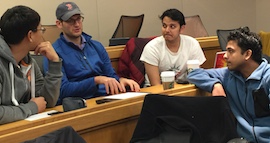
The Relationship Coffee Institute (RCI) is a nonprofit, public benefit corporation – or, B Corp – working to increase social and economic opportunity for smallholder commodity farmers and their families. Its partner, Sustainable Harvest, is one of the largest importers of fair trade specialty coffee in the U.S.
“What this company is trying to do is important and innovative and I can learn from that,” she said. “Hopefully we will have had an impact at the end of the project and get a better understanding how a private company can help alleviate poverty.”
The MAP in Rwanda is one of eight student projects organized and sponsored by WDI. MAP is an action-based learning course offered at Ross for MBA students who receive guidance from their faculty advisors. Each project requires analytical rigor, critical thinking, and teamwork. Sponsors receive top-notch deliverables and data-driven recommendations from the team of students.
After learning about their projects and conducting research in the classroom for several weeks, the students then spend three to four weeks working alongside their project sponsors in the field.
Sylvia Jimenez will work on a WDI-sponsored MAP team for CARE, a non-profit organization seeking to use business approaches to address social issues.
“I’m looking forward to getting out of my comfort zone and doing something different than I have done before,” she said. “I think I’ll learn a lot about me as a team player, and learn about my teammates and what their strengths are.”
Ted London, vice president of WDI’s Scaling Impact Initiative, is one of the faculty advisors on the Sustainable Harvest and CARE MAPs as well as two others. Before the teams traveled to their destinations for on-the-ground work, he brought them together for a special WDI-focused session to get to know each other better before they left and to touch on some of the key issues the teams will face in the field.
He discussed what it takes to conduct good interviews, particularly in a base of the pyramid (BoP) market context, emphasizing that the goal of these interviews is to develop data-driven recommendations. Among other things, he also told the students to approach people they meet and interview with respect and humility to maximize the depth and quality of the data collected during the interview.
“You are not only there as expert problem-solvers, but also as experts in learning and listening,” he said. “Only by collaborating and co-creating can we build solutions that really work.”
London said his MAP projects allow students to take what they learned in the classroom and apply it in a BoP context.
“For students interested in working in this space as a career, it is an amazing opportunity,” he said. “These MAPs open students’ eyes to this part of the world and to this scale of enterprise and impact. They’re part of the minority seeing how the majority of the world conducts business.”
WDI and its partners get value from the experience as well, London said. Seven of the eight MAP projects are with partners that have long-term relationships with WDI.
“By leveraging MAP and the great skills of the Ross students, we’re providing resources and expertise to our partners to help them solve the problems they’re facing,” London said. “And it’s a way for us to collaborate with partners in the field, apply our knowledge, and learn what are the next-generation tools we need to think about in the future.”
Here is a summary of each MAP project:
Aravind Eye Care System – India
Advised By: Paul Clyde, WDI and Ross School of Business; Peter Lenk, Ross School of Business
MAP Team: Jackie Barnum, Katie Redman, Alex Kravitz, Matt Tafoya
Aravind Eye Care System (AECS) has five tertiary care centers, six secondary care centers, six community clinics, and 54 primary eye care centers across the Tamil Nadu state in India. Now AECS is expanding, opening tertiary hospitals in Chennai and Tirupathi in the next couple of years, and there are also plans to expand the services/facilities in the existing hospital units.
The student team will customize and test at two to three AECS facilities an existing process model that will measure performance of each unit and is understandable to everyone in the organization.
Cooperative for Assistance and Relief Everywhere (CARE) – India
Advised By: Ted London, WDI and Ross School of Business; Jane Dutton, Ross School of Business
MAP Team: Karina Cabanillas, David Chang, Takashi Takizawa, Sylvia Jimenez
CARE has been working in India for over 65 years, focusing on ending poverty and social injustice. Its overall goal is the empowerment of women and girls from poor and marginalized communities leading to improvement in their lives and livelihoods.
Most smallholder farmers, a vast majority of whom are women, have limited access to quality and affordable agriculture input, services, finance and technologies. The student team will develop a profitable and socially inclusive business plan that CARE can execute in 2016 that facilitates access for smallholder farmers to inputs and related services. This should be a commercially viable and financially sustainable approach that avoids donor dependency through the development of an agricultural input supply social enterprise in India.
Sustainable Harvest & Relationship Coffee Institute – United States
Advised By: Ted London, WDI and Ross School of Business; Ravi Anupindi, WDI and Ross School of Business
MAP Team: Stacey Nathan, Whitney Augustine, Erdem Eray, Grant Cowherd
Sustainable Harvest of Portland, Ore. is an importer of high quality, specialty grade coffees from smallholder farmers from 15 countries around the world. In 2012, Sustainable Harvest formed a nonprofit organization, the Relationship Coffee Institute (RCI), to help propagate its business model and advance farmer training. In fall 2015, in conjunction with RCI and 4,000 women farmers in Rwanda, Sustainable Harvest launched Question Coffee, which represents its fundamental goal to empower coffee farmers and foster sustainable supply chains. It is Sustainable Harvest’s first B Corp certified product throughout the entire value chain, meaning it’s a for-profit entity that includes positive impacts on society, workers, and the environment. Net proceeds from Question Coffee go to farmer training, which contributes to better quality, improved yields and increased income and wellbeing for coffee farmers at the base of the pyramid.
The student team will conduct research to identify Question Coffee’s value proposition to consumers, resulting in several specific, actionable recommendations on branding and marketing strategies. The team also will devise several recommendations and strategies for greater market penetration.
Relationship Coffee Institute (in partnership with Sustainable Harvest) – Rwanda
Advised By: Ted London, WDI and the Ross School of Business; Jane Dutton, Ross School of Business
MAP Team: Courtney Landy, Aaron Whallon, Juan Marino, Kerry Shields
For this project, the student team will test and evaluate the value of B Corp certification to see if it could improve the lives of smallholder farmers in Rwanda, and how it could be scaled or applied to other commodities.
Zemen Bank – Ethiopia
Advised By: Paul Clyde, WDI and Ross School of Business; Bob Dittmar, Ross School of Business
MAP Team: Dana Yerace, Max Jacobson, Florence Noel, Nicholas Mencher
Zemen is a commercial bank located in Addis Ababa, Ethiopia. Its vision is to bring new dynamism to the financial sector and the banking business in Ethiopia. It is interested in serving small- and medium-sized enterprises (SMEs). Using a banking scheme in which Ethiopians living in the U.S. could put a hold on some monetary amount in their bank account, Zemen would then access the account for a low interest loan for Ethiopian citizens starting or expanding a small business. The hold on the U.S. bank would be reduced as the loan is paid back.
The student team will develop the business case for diaspora SME loans and assess the prospects for scaling the program to a level that would interest Zemen Bank. If the scheme were deemed viable, then the team would formulate a plan for executing the program.
Imperial Health Sciences (IHS) – South Africa
Advised By: Paul Clyde, WDI and Ross School of Business; Ravi Anupindi, WDI and Ross School of Business
MAP Team: Amit Patel, Jennifer Paxton, Anuja Mehta, Aric Adams
IHS provides supply chain solutions to the public and private pharmaceutical markets in Africa. IHS and the Imperial Logistics group have adopted the Unjani project as its Corporate Social Responsibility project. Unjani aims to establish a network of nurse-owned franchise clinics in historically underserved communities across South Africa. It has 19 operating clinics with plans to add 25 more by May. The group will take over an independent, failing clinic.
The student team will assess the change in the failing clinic’s success level after instituting the processes, controls, training, and marketing of the Unjani franchise network. Examining the operational and environmental factors of the clinic, along with some financial analysis, will allow IHS to better understand why this clinic failed. That will help IHS further develop the Unjani concept and ensure successful clinics in the future.
ITC Ltd. – India
Advised By: Ted London, WDI and Ross School of Business; Venkatram Ramaswany, Ross School of Business
MAP Team: Nishant Agrawal, Kee Cho, Arun Prakash, Dave Teebagy
ITC is a major diversified Indian conglomerate. ITC’s e-Choupal initiative is enabling Indian agriculture to enhance its competitiveness by empowering Indian farmers through the power of the Internet. The initiative facilitates the two-way flow of goods and services in and out of villages, and describes itself as the largest Internet-based intervention in rural India by a corporate entity.
The student team will help ITC design the next version of e-Choupal. The team will deliver a report exploring how the first three versions of e-Choupal have created value and where further opportunities for value creation may exist. The team also will look into how other models of rural farmer engagement are being deployed in other developing countries, identify the various stakeholders impacted, and highlight how the proposed model creates value for them.
Aparajitha Foundation – India
Advised By: Paul Clyde, WDI and Ross School of Business; Jim Walsh, Ross School of Business
MAP Team: Jamyle Michael, Holly Price, Aaron Steiner, Meghan Sheehan
The Aparajitha Foundation is an arm of the Aparajitha Group. It is committed to the cause of creating transformational change in adolescents by using audiovisual technology to deliver life skills training to economically disadvantaged children in India’s Tamil Nadu state.
The MAP team will develop a complete business plan for entrepreneurship education, training and development. The model should be scalable so that it can be used across the country in the future.
WDI’s Scaling Impact Initiative is working with Walmart to chronicle what the retail giant has learned from its efforts to include small producers in global supply chains.
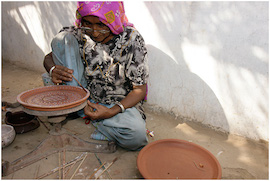
The successes, challenges, and lessons learned will become a policy brief and a teaching case, both written by WDI in collaboration with Professor Linda Scott of Oxford University’s Said Business School. Both documents will be published this spring, and are geared toward Walmart and other retailers looking to develop more effective sourcing programs in the future.
WDI Vice President of Scaling Impact Ted London and Research Manager Colm Fay, along with Scott, are studying two Walmart programs.
One is Empowering Women Together, which sources handicrafts from women-owned base of the pyramid businesses in East Africa, Nepal, India and other emerging markets to sell online. The other is Direct Farm, which buys fresh fruits and vegetables from small- and medium-sized farmers to supply Walmart’s stores in Central and South America, Mexico, South Africa, and India.
The team has interviewed managers from Walmart, the Walmart Foundation, and their implementing partners.
This is the second collaboration between WDI and Walmart. Last year, WDI Publishing released a case study on the evolution of a global cross-sector partnership between Walmart and the United States Agency for International Development (USAID). The case looked at what had been gleaned – both positive and negative – during the 15-year collaboration between the two organizations.
The free case, “Walmart and USAID: The Evolution of a Global Cross-Sector Partnership,” focused on partnerships that sought to engage smallholder farmers in the developing world, and highlighted examples from Honduras, Guatemala, Rwanda and Bangladesh. It explored the ways in which these collaborations came about, how they were supported by the partners, and the level of success achieved as measured by Walmart, the Walmart Foundation, and USAID.
The case also identified lessons learned for the future of the Walmart/USAID collaboration, and insights that may apply to the development of public-private partnerships for development more broadly.
In addition, NextBillion’s Kyle Poplin wrote a post on how the case was developed. And Beth Keck, senior director of Women’s Economic Empowerment at Walmart, sat down for a video interview with WDI’s London about the company’s global work.
Image courtesy of Navel Zaveri/Flickr.